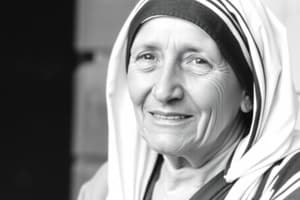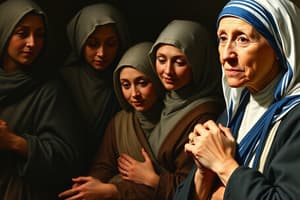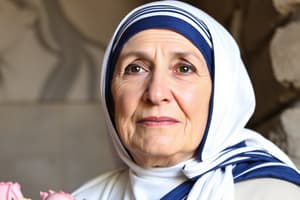Podcast
Questions and Answers
The description focuses on the living conditions of the wealthy in Calcutta.
The description focuses on the living conditions of the wealthy in Calcutta.
False (B)
Mother Teresa's experiences are highlighted in the text.
Mother Teresa's experiences are highlighted in the text.
True (A)
The content describes a specific instrument used to alleviate poverty.
The content describes a specific instrument used to alleviate poverty.
False (B)
The hardships of the time are detailed in the text.
The hardships of the time are detailed in the text.
The focus of the description is on the comforts enjoyed by the privileged.
The focus of the description is on the comforts enjoyed by the privileged.
Teresa faced numerous needs in Motijhil, making it easy to know where to begin.
Teresa faced numerous needs in Motijhil, making it easy to know where to begin.
Teresa spent two decades focusing on educating children.
Teresa spent two decades focusing on educating children.
Teresa taught slum children by writing letters in the dust with a stick.
Teresa taught slum children by writing letters in the dust with a stick.
The Loreto Sisters provided Teresa with a modern desk made of metal.
The Loreto Sisters provided Teresa with a modern desk made of metal.
Teresa gained her first companion on the feast of St. Joseph the Worker.
Teresa gained her first companion on the feast of St. Joseph the Worker.
The Missionaries of Charity were well-received by everyone in India without any opposition.
The Missionaries of Charity were well-received by everyone in India without any opposition.
Mother Teresa confronted angry mobs by asking them to stop disturbing the dying patients.
Mother Teresa confronted angry mobs by asking them to stop disturbing the dying patients.
A local businessman provided monthly supplies of food and clothing to the patients.
A local businessman provided monthly supplies of food and clothing to the patients.
Trust was eventually established with Hindu neighbors and high caste volunteers.
Trust was eventually established with Hindu neighbors and high caste volunteers.
The Missionaries of Charity's goal was to forcefully convert everyone they encountered.
The Missionaries of Charity's goal was to forcefully convert everyone they encountered.
Mother Teresa's initial goal was primarily to convert people to Christianity.
Mother Teresa's initial goal was primarily to convert people to Christianity.
The House of the Dying was established to provide dignity to the marginalized.
The House of the Dying was established to provide dignity to the marginalized.
Nirmala Shishu Bhavan was an orphanage opened by Mother Teresa in 1955.
Nirmala Shishu Bhavan was an orphanage opened by Mother Teresa in 1955.
Dalit women often had sufficient resources for raising their children.
Dalit women often had sufficient resources for raising their children.
Mother Teresa believed that loneliness was one of the worst pains people could experience.
Mother Teresa believed that loneliness was one of the worst pains people could experience.
St. Teresa of Calcutta worked to care for orphaned and impoverished children.
St. Teresa of Calcutta worked to care for orphaned and impoverished children.
Only the local government supported individual orphans in Calcutta.
Only the local government supported individual orphans in Calcutta.
Leprosy was not considered a significant health concern in the Calcutta slums.
Leprosy was not considered a significant health concern in the Calcutta slums.
The Nirmala Shishu Bhavan orphanage became overcrowded due to the large number of children.
The Nirmala Shishu Bhavan orphanage became overcrowded due to the large number of children.
Mother Teresa initiated fundraising efforts to provide medication for lepers.
Mother Teresa initiated fundraising efforts to provide medication for lepers.
Subhasini Das joined Mother Teresa's ministry and became Sister Agnes.
Subhasini Das joined Mother Teresa's ministry and became Sister Agnes.
Mother Teresa expressed gratitude to God for sending only one aspirant to join her.
Mother Teresa expressed gratitude to God for sending only one aspirant to join her.
All the girls who joined Mother Teresa came from wealthy families.
All the girls who joined Mother Teresa came from wealthy families.
The aspirants who joined Mother Teresa were unaware of the difficulties they would face.
The aspirants who joined Mother Teresa were unaware of the difficulties they would face.
Mother Teresa thanked God for the young women who felt a calling to help in her ministry.
Mother Teresa thanked God for the young women who felt a calling to help in her ministry.
Mother Teresa's ministry began with a deep prayer life and Eucharist.
Mother Teresa's ministry began with a deep prayer life and Eucharist.
The Indian government provided consistent financial support to Mother Teresa without any complex situations.
The Indian government provided consistent financial support to Mother Teresa without any complex situations.
Mother Teresa's work was motivated by personal encounters with marginalized individuals.
Mother Teresa's work was motivated by personal encounters with marginalized individuals.
Mother Teresa's ministry focused solely on the wealthy class in Calcutta.
Mother Teresa's ministry focused solely on the wealthy class in Calcutta.
The government legislation in India required facilities for every 100 students helped Mother Teresa expand her ministry.
The government legislation in India required facilities for every 100 students helped Mother Teresa expand her ministry.
The mobile leprosy clinic was established by Mother Teresa in 1957.
The mobile leprosy clinic was established by Mother Teresa in 1957.
The Indian government did not support the Missionaries with land for a leper colony.
The Indian government did not support the Missionaries with land for a leper colony.
The mobile clinics were sufficient to manage all leprosy patients in Calcutta without the need for stationary clinics.
The mobile clinics were sufficient to manage all leprosy patients in Calcutta without the need for stationary clinics.
Mother Teresa used the proceeds from raffling Pope Paul VI's car to build a hospital in Shanti Nagar.
Mother Teresa used the proceeds from raffling Pope Paul VI's car to build a hospital in Shanti Nagar.
Mother Teresa's first trip outside of India since 1929 was to Las Vegas.
Mother Teresa's first trip outside of India since 1929 was to Las Vegas.
Lazar was a successful businessman who had avoided politics.
Lazar was a successful businessman who had avoided politics.
By 1960, the Missionaries had not yet gained any international recognition for their work.
By 1960, the Missionaries had not yet gained any international recognition for their work.
Mother Teresa did not want to see her brother, Lazar, during her visit to Rome.
Mother Teresa did not want to see her brother, Lazar, during her visit to Rome.
Pope John XXIII's leadership was seen as minimal due to his advanced age.
Pope John XXIII's leadership was seen as minimal due to his advanced age.
The Soviet Union's control over Albania allowed for a family reunion between Teresa and Lazar.
The Soviet Union's control over Albania allowed for a family reunion between Teresa and Lazar.
St. Teresa requested a decretum laudis from the Pope to expand her mission.
St. Teresa requested a decretum laudis from the Pope to expand her mission.
The Missionaries of Charity were limited to working only within India due to canon law.
The Missionaries of Charity were limited to working only within India due to canon law.
Pope Paul VI granted the decree five years after St. Teresa's initial request.
Pope Paul VI granted the decree five years after St. Teresa's initial request.
The Missionaries of Charity began their international work in Brazil.
The Missionaries of Charity began their international work in Brazil.
Canon law prohibited new religious orders from starting a second mission until 15 years after their founding.
Canon law prohibited new religious orders from starting a second mission until 15 years after their founding.
Flashcards
Mother Teresa's early work
Mother Teresa's early work
Mother Teresa's initial work focused on basic education, hygiene, and treating minor injuries in an open-air school.
House of the Dying
House of the Dying
A facility established by Missionaries of Charity to provide care for the dying, facing suspicion and hostility from Hindus initially.
Missionaries of Charity's goal
Missionaries of Charity's goal
Show compassion and care for people, regardless of religion.
Nirmala Shishu Bhavan
Nirmala Shishu Bhavan
Signup and view all the flashcards
Orphan child support
Orphan child support
Signup and view all the flashcards
Calcutta slums' health conditions
Calcutta slums' health conditions
Signup and view all the flashcards
Mother Teresa's compassion
Mother Teresa's compassion
Signup and view all the flashcards
Subhasini Das's role
Subhasini Das's role
Signup and view all the flashcards
Early ministry's growth
Early ministry's growth
Signup and view all the flashcards
Missionaries of Charity's support
Missionaries of Charity's support
Signup and view all the flashcards
Personal encounters
Personal encounters
Signup and view all the flashcards
Mobile leprosy clinic
Mobile leprosy clinic
Signup and view all the flashcards
Shanti Nagar
Shanti Nagar
Signup and view all the flashcards
International support
International support
Signup and view all the flashcards
Church's relevance
Church's relevance
Signup and view all the flashcards
Pontifical Supervision
Pontifical Supervision
Signup and view all the flashcards
Mother Teresa's US trip
Mother Teresa's US trip
Signup and view all the flashcards
Dalits
Dalits
Signup and view all the flashcards
Indian Government's role
Indian Government's role
Signup and view all the flashcards
Pope Paul VI's role
Pope Paul VI's role
Signup and view all the flashcards
Government assistance complexity
Government assistance complexity
Signup and view all the flashcards
Overcrowding of facilities
Overcrowding of facilities
Signup and view all the flashcards
Calcutta's partition issue
Calcutta's partition issue
Signup and view all the flashcards
Study Notes
Early Work in Motijhil
- Mother Teresa started her work by teaching children in an open-air school.
- She focused on basic education: the alphabet, hygiene, and treating minor injuries.
- She was offered a convent space on the second floor of a private home.
- The Loreto Sisters helped with resources to create a desk, bookshelf, and altar.
The House of the Dying
- The Missionaries of Charity faced suspicion and hostility from Hindus who thought they were trying to convert patients.
- Mother Teresa explained that their aim was to show love and care, not force conversion.
- During confrontations, a mob threw bricks and stones at the House of the Dying, while Mother Teresa remained calm and defended the patients.
- Trust was eventually established with Hindu neighbors and volunteers.
Early Days of Mother Teresa's Work
- Mother Teresa aimed to help people find God, regardless of religion.
- Her goal was to give dignity to the marginalized by offering a sense of belonging.
- In 1955, she opened Nirmala Shishu Bhavan, an orphanage for parentless children and pregnant women.
Orphanage Care
- Orphan children were taught trades to support themselves.
- Sponsors from around the world supported individual orphans.
- Surrogate parents contributed funds that were given to orphans upon leaving the orphanage.
Calcutta Slums
- Nirmala Shishu Bhavan quickly became overcrowded.
- The Bengali government helped establish additional orphanages.
Health Conditions
- Slum dwellers faced illnesses due to unsanitary conditions and malnutrition.
- Leprosy was a significant health concern, causing physical and social suffering.
- The partition of India and Pakistan led to a surge of lepers in Calcutta's slums.
Compassion and Action
- Mother Teresa was compassionate towards lepers and recognized their suffering.
- She initiated fund-raising efforts to provide medication and address their needs.
Subhasini Das and Mother Teresa
- Subhasini Das, one of Teresa's students, joined her ministry.
- She became Sister Agnes and stayed with Mother Teresa until she died of cancer.
- Mother Teresa was deeply grateful for Subhasini joining her work.
- Soon, ten girls joined Mother Teresa, making sacrifices and leaving their families.
Mother Teresa of Calcutta
- Mother Teresa's ministry began with a strong prayer life and Eucharist.
- Her work grew rapidly, requiring the establishment of schools and buildings.
- Some buildings were donated, but others were acquired through legislation that required facilities for every 100 students.
Indian Government Support
- The Indian government supported Mother Teresa and the Missionaries of Charity with aid.
- This support arose from a complex situation that included the aftermath of independence and Gandhi's assassination.
- The government's limited resources made it difficult to conduct social reforms.
- However, Mother Teresa's ministries were welcomed and sometimes supported by the government.
Personal Encounter
- Mother Teresa's work was driven by personal encounters.
- Her experience with women dying on the street led her to support the Dalits.
Mother Teresa's Trip
- Mother Teresa was invited to speak at the US Council for Catholic Women's annual meeting in Las Vegas.
- This trip was her first outside of India since 1929 and marked a significant event.
- While in New York City, she was struck by the poverty amidst the wealth.
- She also traveled to Europe and visited her brother, Lazar, in Rome.
- Despite their contrasting lives and religious views, they met cordially.
- Teresa also met with Pope John XXIII in an audience, despite his expected short term as Pope.
The Mobile Leprosy Clinic and Shanti Nagar
- In 1957, Mother Teresa launched a mobile leprosy clinic to reach patients within the slums.
- The Missionaries established a fleet of mobile clinics to provide treatment without requiring patients to travel.
- Stationary clinics in Calcutta remained necessary due to the large number of patients.
- The Indian government provided land to build Shanti Nagar, a leper colony, offering a dignified living environment.
- International support contributed funds for construction of dwellings in Shanti Nagar.
- Mother Teresa famously raffled off Pope Paul VI's used car to help fund a hospital in Shanti Nagar.
Early Days of the Missionaries of Charity
- Church leaders sought to demonstrate Catholicism's relevance in the modern world.
- St. Teresa requested a decretum laudis (decree of praise) to allow the Missionaries to expand beyond India.
- The Missionary Sisters were placed under pontifical supervision, allowing them to expand their ministries.
- Pope Paul VI granted the decree five years later, enabling St. Teresa and the Sisters to found a mission in Venezuela, marking the international expansion of the Missionaries of Charity.
Studying That Suits You
Use AI to generate personalized quizzes and flashcards to suit your learning preferences.




